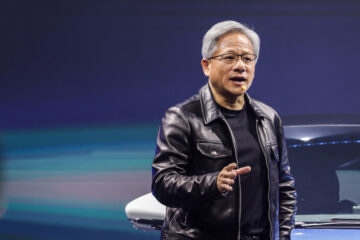Despite spending years being compared to domestic contemporaries like Toyota (TM) and Honda (HMC) , Japanese automaker Nissan (NSANY) is turning a new page, though not precisely for good or for the better.
These days, it operates as a shell of its former self. In late November this year, Nissan executives told the Financial Times that it has “12 to 14 months” to survive if it does not get its act together.
In the United States, one of its key competitive markets, data from Automotive News shows that Nissan dealers are at their lowest profitability levels in nearly 15 years and that their market share is at its lowest in the last five years.
💰💸 Don’t miss the move: SIGN UP for TheStreet’s FREE Daily newsletter 💰💸
With so much riding on the line, Nissan’s incoming U.S. boss Christian Meunier is promising substantial change once he reports to his new post in January, saying he’ll “work [his] butt off” to get Nissan back on track.
“We need to go fight on the gemba (Japanese for “the actual place”) — on the field — get shit done and grow again,” he told dealers on a Zoom meeting.
Makoto Uchida (L), president and CEO of Japanese auto maker Nissan, shakes hands with Toshihiro Mibe (R), director, president and representative executive officer of auto maker Honda, following a press conference in Tokyo on August 1, 2024.
RICHARD A. BROOKS/Getty Images
Nissan and Honda may get even closer, Nikkei reports.
The Japanese automotive space may get even smaller.
According to sources who have spoken to Nikkei, Nissan and Honda are considering a possible merger.
The report noted that the two Japanese auto giants are in discussions to deepen ties and allow themselves to make it easier to collaborate on technology that would help their respective companies better compete as a domestic rival to Toyota.
The sources note that these talks included the possibility of setting up a holding company, a full merger, and ways to include Mitsubishi Motors—of which Nissan has a 24% stake.
Following earlier reports of the talks, Honda’s Executive Vice President Shinji Aoyama told Bloomberg that the company is considering several options, including a merger, capital tie-up, or the establishment of a holding company.
With Mitsubishi or not, a combined Honda and Nissan would become the world’s third-largest automaker; surpassing South Korean automaker Hyundai and even the 14-brand multinational behemoth Stellantis (STLA) .
Related: Former Nissan CEO thinks alliance is a hidden sinister plot
Nissan and Honda were [technically] halfway there
The automakers hope that by pooling their resources, they’ll be better prepared to tackle the competition from rivals like Tesla and Toyota, as well as Chinese auto industry giants like BYD.
The merger talks come months after Nissan and Honda agreed to share key EV technology like batteries and software, a move intended to accelerate the development of EVs while halving the money each needed to invest in research.
By the time Mitsubishi joined in their treaty on August 1, Nissan and Honda had already agreed to what they called “mutual vehicle complementation,” which allows them to share models and complete each other’s lineups of EVs and gas-powered cars.
However, in an interview with Automotive News the same month, former Nissan CEO Carlos Ghosn alleged that Honda’s deal with Nissan was a secret “disguised takeover” of Nissan and Mitsubishi. He notes that in its marriage, Honda is essentially in the “driver’s seat” to control things.
“I can’t imagine for one moment how it’s going to work between Honda and Nissan unless it’s a takeover, unless it’s a disguised takeover by Honda of Nissan and Mitsubishi with Honda in the driver’s seat,” Ghosn said.
“It’s going to be a takeover, a disguised takeover.”
More Automotive:
Toyota sales slide in Japan and China—what’s behind the decline?Jaguar’s controversial rebrand may have a silver lining after allS&P analysts issue stern warning about tariff effect on car buyers
Honda has something Nissan desperately needs
Nissan may have shifted around its C-suite to better strategize for its near-term health, but its long-term viability has been stunted by missing out on a product that Honda is currently making waves in: hybrids.
Granted their intentions to collaborate and share key technologies, a Nissan-Honda merger would theoretically give Nissan access to hybrid systems that Honda currently uses in hybrid versions of the CR-V crossover, the compact Civic, and the Accord sedan.
Nissan currently sells zero hybrid-electric vehicles, a segment dominated by rival Toyota and accounting for a chunk of Honda’s sales.
As per Automotive News, Nissan is far behind schedule in developing any meaningful hybrid product. One former Nissan executive told the publication that the delay was due to shortfalls with Nissan’s e-Power series hybrid technology, which was not ready for U.S. customers.
“The U.S. team was not completely convinced that the electrification system was good for their business,” the former exec said. “They said U.S. consumers are not ready. It was a conservative approach.”
With or without Honda, Nissan expects to bring three electrified variants of its Rogue crossover to the U.S. within the next three years. Nissan plans to release a plug-in hybrid model in late 2025, followed by a version using Nissan’s e-Power tech and a range-entended version soon after.
The Nissan Motor Company trades on OTC markets in the United States as NSANY and on the Tokyo Stock Exchange under the ticker number 7201.
The Honda Motor Company is listed on the New York Stock Exchange under the ticker HMC.
Related: The 10 best investing books (according to stock market pros)


